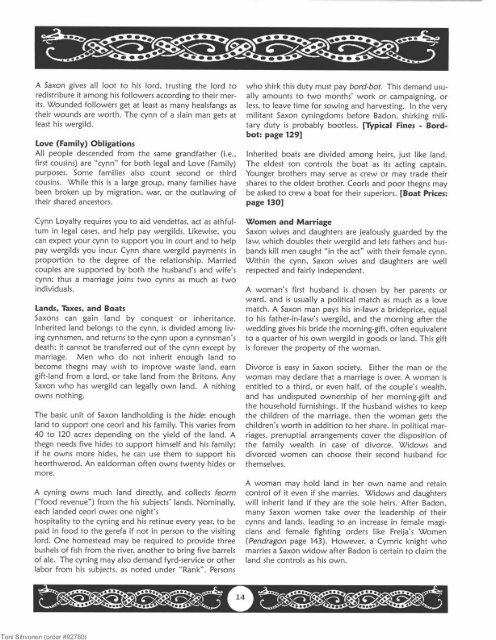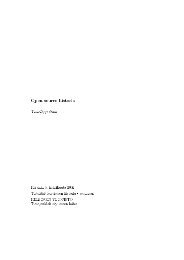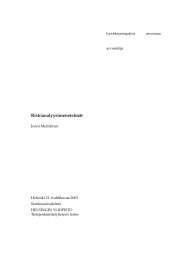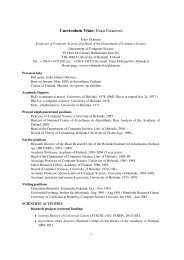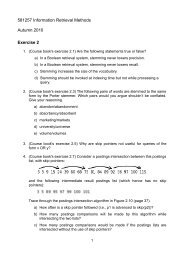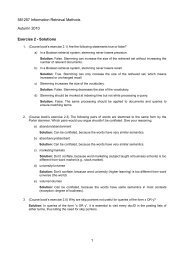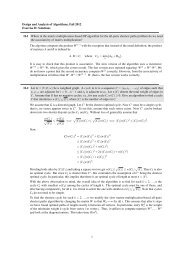Toni Sihvonen (order #92780) 62.142.248.1
Toni Sihvonen (order #92780) 62.142.248.1
Toni Sihvonen (order #92780) 62.142.248.1
You also want an ePaper? Increase the reach of your titles
YUMPU automatically turns print PDFs into web optimized ePapers that Google loves.
<strong>Toni</strong> <strong>Sihvonen</strong> (<strong>order</strong> <strong>#92780</strong>) 6<br />
A Saxon gives all loot to his lord, trusting the lord to<br />
redistribute it among his followers according to their merits.<br />
Wounded followers get at least as many healsfangs as<br />
their wounds are worth. The cynn of a slain man gets at<br />
least his wergild.<br />
Love (Family) Obligations<br />
All people descended from the same grandfather (i.e.,<br />
first cousins) are “cynn” for both legal and Love (Family)<br />
purposes. Some families also count second or third<br />
cousins. While this is a large group, many families have<br />
been broken up by migration, war, or the outlawing of<br />
their shared ancestors.<br />
Cynn Loyalty requires you to aid vendettas, act as athfultum<br />
in legal cases, and help pay wergilds. Likewise, you<br />
can expect your cynn to support you in court and to help<br />
pay wergilds you incur. Cynn share wergild payments in<br />
proportion to the degree of the relationship. Married<br />
couples are supported by both the husband’s and wife’s<br />
cynn; thus a marriage joins two cynns as much as two<br />
individuals.<br />
Lands, Taxes, and Boats<br />
Saxons can gain land by conquest or inheritance.<br />
Inherited land belongs to the cynn, is divided among living<br />
cynnsmen, and returns to the cynn upon a cynnsman’s<br />
death; it cannot be transferred out of the cynn except by<br />
marriage. Men who do not inherit enough land to<br />
become thegns may wish to improve waste land, earn<br />
gift-land from a lord, or take land from the Britons. Any<br />
Saxon who has wergild can legally own land. A nithing<br />
owns nothing.<br />
The basic unit of Saxon landholding is the hide: enough<br />
land to support one ceorl and his family. This varies from<br />
40 to 120 acres depending on the yield of the land. A<br />
thegn needs five hides to support himself and his family:<br />
if he owns more hides, he can use them to support his<br />
heorthwerod. An ealdorman often owns twenty hides or<br />
more.<br />
A cyning owns much land directly, and collects feorrn<br />
(“food revenue”) from the his subjects’ lands. Nominally,<br />
each landed ceorl owes one night’s<br />
hospitality to the cyning and his retinue every year, to be<br />
paid in food to the gerefa if not in person to the visiting<br />
lord. One homestead may be required to provide three<br />
bushels of fish from the river, another to bring five barrels<br />
of ale. The cyning may also demand fyrd-service or other<br />
labor from his subjects, as noted under “Rank”. Persons<br />
who shirk this duty must pay bord-bot. This demand usually<br />
amounts to two months’ work or campaigning, or<br />
less, to leave time for sowing and harvesting. In the very<br />
militant Saxon cyningdoms before Badon, shirking military<br />
duty is probably bootless. pypical Fines - Bordbot:<br />
page 1291<br />
Inherited boats are divided among heirs, just like land.<br />
The eldest son controls the boat as its acting captain.<br />
Younger brothers may serve as crew or may trade their<br />
shares to the oldest brother. Ceorls and poor thegns may<br />
be asked to crew a boat for their superiors. [Boat Prices:<br />
page 1301<br />
Women and Marriage<br />
Saxon wives and daughters are jealously guarded by the<br />
law, which doubles their wergild and lets fathers and husbands<br />
kill men caught “in the act” with their female cynn.<br />
Within the cynn, Saxon wives and daughters are well<br />
respected and fairly independent.<br />
A woman’s first husband is chosen by her parents or<br />
ward, and is usually a political match as much as a love<br />
match. A Saxon man pays his in-laws a brideprice, equal<br />
to his father-in-law’s wergild, and the morning after the<br />
wedding gives his bride the morning-gift, often equivalent<br />
to a quarter of his own wergild in goods or land. This gift<br />
is forever the property of the woman.<br />
Divorce is easy in Saxon society. Either the man or the<br />
woman may declare that a marriage is over. A woman is<br />
entitled to a third, or even half, of the couple’s wealth,<br />
and has undisputed ownership of her morning-gift and<br />
the household furnishings. If the husband wishes to keep<br />
the children of the marriage, then the woman gets the<br />
children’s worth in addition to her share. In political marriages,<br />
prenuptial arrangements cover the disposition of<br />
the family wealth in case of divorce. Widows and<br />
divorced women can choose their second husband for<br />
themselves.<br />
A woman may hold land in her own name and retain<br />
control of it even if she marries. Widows and daughters<br />
will inherit land if they are the sole heirs. After Badon,<br />
many Saxon women take over the leadership of their<br />
cynns and lands, leading to an increase in female magicians<br />
and female fighting <strong>order</strong>s like Freija’s Women<br />
(Pendragon page 143). However, a Cymric knight who<br />
marries a Saxon widow after Badon is certain to claim the<br />
land she controls as his own.


